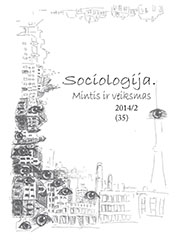Kvaišalų geografija posovietiniame mieste: nelegali narkotinių medžiagų apyvarta ir narkomanija Klaipėdoje, 1990-2010 m.
Geography of drugs in post-Soviet urban space: Drug crimes and drug abuse in Klaipeda, 1990-2010
Author(s): Liutauras Kraniauskas, Laimonas BeteikaSubject(s): Politics / Political Sciences, Social Sciences, Methodology and research technology, Criminology, Substance abuse and addiction, Transformation Period (1990 - 2010), Post-Communist Transformation, Sociology of Politics
Published by: Vilniaus Universiteto Leidykla
Keywords: drug crime; drug abuse; urban space; post-soviet; spatial analysis;
Summary/Abstract: This study explores transformations of local drug geography in Klaipeda, 1990-2010. Using spatial analysis of geocoded data about 1351 cases of drug crime (manufacturing, storing, possession, and sale) and 1510 registered drug users, we researched spatial temporal patterns of drug crime and drug abuse in changing post-soviet urban environment. Data for this study was provided by Klaipeda Police Headquarters and Klaipeda Centre for Addictive Disorders. We found, that key changes within local drug geography started in 1997-1999 and were caused by development of new economy expanding drug sale to anonymous customers. Since the collapse of the Soviet regime, drugs were mostly manufactured, circulated and used within underground social networks of drug users. The main features of those networks were trust and direct communication among drug users and dealers, who regularly were drug users also. Therefore drugs were locally produced, stored, sold and used in the same places; places of drug abuse and drug crime regularly overlapped. Nevertheless spatial patterns of such underground networks were more accidental in their nature, they had not clear attributes of spatial identify within urban environment. But newly emerging drug economy was based on commodity-money relations between drug dealers and drug users and new market regime clearly differentiated places of drug sale and drug use. Drug sale moved from blocks to the night clubs, marketplaces and surroundings of huge shopping centres. Sociologically such change within drug economy of post-soviet city might be interpreted as a shift from subcultural networks, where local knowledge and practices of street pharmacology were transmitted to new users, to the conspicuous consumption of branded and recreational drugs .
Journal: Sociologija. Mintis ir Veiksmas
- Issue Year: 2014
- Issue No: 02
- Page Range: 271-332
- Page Count: 62
- Language: Lithuanian

